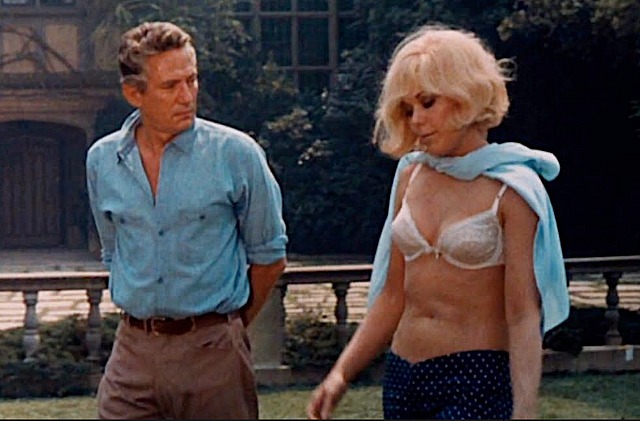“Heavy-handed camp about Hollywood — an attempt to fuse Sunset Boulevard, Vertigo, The Barefoot Contessa and Whatever Happened to Baby Jane?. Peter Finch plays a Svengali-like movie director. His great star, the glamorous foreigner Lylah Clare, died mysteriously a few hours after marrying him, and now he is turning a young American actress (Kim Novak) into Lylah. The stale, gaudy script (from a teleplay by Robert Thom and Edward De Blasio) provides roles for Coral Browne as a bitch columnist, Rossella Falk as a predatory European lesbian, and Valentina Cortese as a designer.
“Maybe an amusing macabre pastiche could have been made of it if the director, Robert Aldrich, hadn’t been so clumsy; it’s a static piece of filmmaking. With Michael Murphy, George Kennedy and Ernest Borgnine, who has rarely been worse — he demonstrates his shouting range.” — Pauline Kael on Robert Aldrich‘s The Legend of Lylah Clare (’68).

Roger Ebert wrote the film was “awful…but fairly enjoyable“, while Life‘s Richard Schickel felt that the film would catch on as a cult classic because it was “not merely awful…it is grandly, toweringly, amazingly so…I laughed myself silly at Lylah Clare, and if you’re in just the right mood, you may too.”
At various times, director Robert Aldrich blamed Novak’s performance and bad editing for the film’s failure. But in 1972, Aldrich said “I think there are a number of faults with” the film. “I was about to bum rap Kim Novak, when we were talking about this the other day, and then I realized that would be pretty unfair. Because people forget that Novak can act. I really didn’t do her justice. But there are some stars whose motion picture image is so firmly and deeply rooted in the public’s mind that an audience comes to a movie with a pre-conception about that person. And that pre-conception makes ‘reality” or any kind of myth that’s contrary to their pre-conceived reality impossible.
“To make this picture work, to make Lylah work, you had to be carried along into that myth. And we didn’t accomplish that. You can blame it on a lot of things, but I’m the producer and I’m the director. I’m responsible for not communicating that to the audience. I just didn’t do it.”
